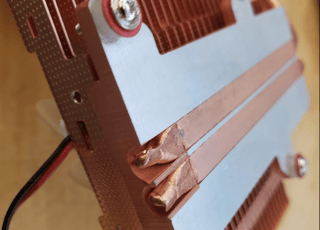Your are correct that the smallest surface area will be a limit on the thermal conductivity. Before we dive into that lets look at the over all approach and some other limits.
Are your temperatures typical for your laptop on forums or per manufacture? Heatsinks are just lumps of metal so you can easily inspect the quality, but heat pipes are full of a working fluid like ethanol. If they are incorrectly filled or punctured their conductivity will be significantly lower. It takes some lab work to determine if they are working or not, but just be aware of this.
My recommendation would be to purchase a replacement heat sink/pipe system for your laptop. This is two fold;
- If the heat pipes were damaged on your first unit then your problem is solved. Also possible that even the Chinese company selling the aftermarket heatsink will have already improved it.
- It is a good practice to have a backup before you modify an item that is critical to your primary computer. I speak from experience on this one ;-)
Another potential limit is the airflow around the fins. If you can increase fan speed from the software or upgrade the fan this will help. Obviously clean fins and larger areas for air passage help. Keep wires out of the air flow path when possible.
Ok to your question. Brazing/soldering may be a good solution. Indium is used in different lead-free solders to lower the melting point. I would just use plumbing solder though for cost and availability. Electrical solder would work too and may be available in a lower temperature version.
The types of metal you are brazing matter. Copper to copper will work great. Aluminum can be brazed, but it is much more difficult requiring acid preparation and aluminum specific brazing rod. Lots of good brazing videos on youtube once you know your metal types.
The biggest risk with doing this is that is possible to damage and or rupture the heat pipes. They are little pressure vessels and will pop under high temperature. Might be okay at that temperature, might not. It is a safety issue; use face shield, glasses, gloves, and bolt it down before heating.
Epoxy with fillers has pretty terrible conductivity compared to metal, but its much better than air if you aren't willing to risk failure of the unit. As long as you don't contaminate the chip mating surfaces; it will either be better or the same. Buy some silver powder and two part 60 min epoxy. Use as much silver powder as the epoxy will wet. Put all the ingredients in the corner of a ziplock bag, evacuate the air, and mix by squeezing back an fourth. This minimizes the amount of air (insulator) in the mix.
Most of the heat pipe units I have seen use a compression assembly (see photo below). Another bit more extreme option, would be to buy a heat pipe/sink system that is close to what you need, then bend the heat pipes and mechanical modify it as need. On the plus side you don't have to damage your currently working unit. Good luck!
